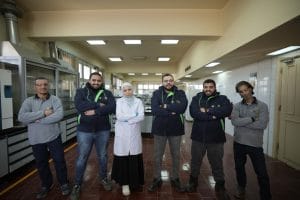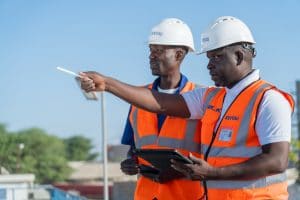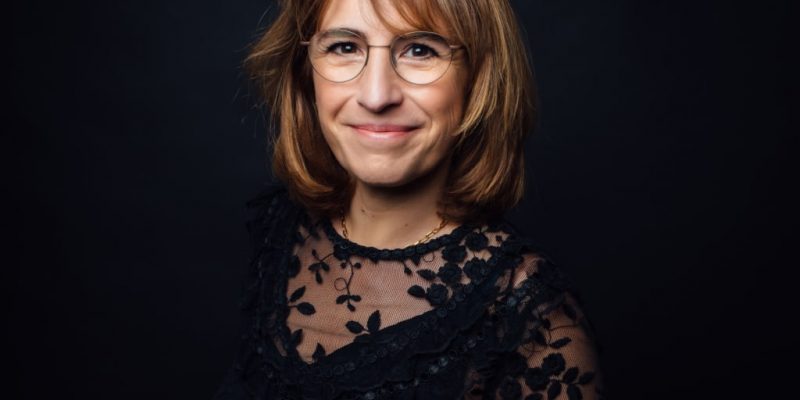After the turmoil linked to the arrival of new shareholders, SUEZ now wants to focus on the development of its international activities, particularly in Africa. As a long-standing partner with water and sanitation plants built in most African capitals, SUEZ is participating as a key player in the 9th World Water Forum, which is taking place in the Senegalese capital Dakar. For Ana Giros, its Deputy Managing Director in charge of international affairs, SUEZ has innovations to contribute and share to improve access to drinking water and sanitation in Africa.
Jean Marie Takouleu: The sale of the “new Suez” by Veolia to a consortium of investors including Meridiam, Global Infrastructure Partners (GIP), Caisse des Dépôts and CNP Assurances was finalized in early February 2022. What will this mean in concrete terms for SUEZ?
Ana Giros: On February 1, 2022, Meridiam, GIP, Caisse des Dépôts and CNP Assurances effectively acquired part of the former SUEZ, in particular the activities in France, Asia, India, Australia and Africa. In this new entity, it is important to emphasize that the entire value chain and all the technical expertise have been retained. We are talking about 35,000 employees, nine research and development (R&D) centers and nearly 7 billion euros in sales. So, it’s a fairly coherent group that retains all of its innovation capabilities, under the leadership of four investors who want to make SUEZ grow. It is a group with 160 years of history and a lot of know-how. This is a new page in its history.
How will the SUEZ Group evolve internationally, in relation to its historical presence?
Internationally, we are in a market that is growing exponentially, particularly in Africa where the needs are enormous. There are of course infrastructure needs, but there are also needs in terms of quality of service, digitalization and network performance. Today, everyone needs to be supported in the ecological transition in the broad sense locally, but also on the issue of water, which must accelerate in the coming years throughout the world. So internationally, we remain very present in Africa and Asia, two important continents where there is strong demographic growth and where we are seeing the impact of climate change, particularly water stress or heavy rainfall. SUEZ can provide solutions to all these issues. We have been in Africa for 70 years, particularly in Egypt, Morocco, Senegal, Ivory Coast, etc. We are present in most of the world’s capital cities. We are present in most African capitals and have been for a long time for the water infrastructure part.
In Africa, SUEZ is involved in wastewater management, drinking water production, waste management… do we expect SUEZ in Africa to accelerate more on water rather than on waste?
At the moment we are in the process of redefining the Group’s strategy and we have not yet decided on this exercise. But what is clear is that we have very important references in water management in Africa. In Morocco, for example, our subsidiary Lydec manages water, sanitation and electricity for 5 million people in Casablanca. We have built infrastructures and water treatment plants, and we help our various customers to have a limited carbon footprint. We are in Senegal where 7 million people have access to drinking water thanks to our services, we have created many infrastructures.
Our objective is to continue to develop the water sector, while continuing to manage waste. In Morocco, for example, we are working hard on industrial waste.
Currently, SUEZ is accelerating its focus on service, i.e. the production and distribution of drinking water. Will this policy continue, and if so, why such a policy?
This policy goes hand in hand with development banks such as the French Development Agency (AFD) and the World Bank Group, which like to invest in infrastructure. In the water sector, we realized that when we have infrastructure, and the water distribution network is aging, we lose water in the pipes.
So somewhere along the line, the efficiency of the network becomes almost as important as the infrastructure. So, we have to invest in the networks and the physical and commercial performance as well as the quality of services we provide to our customers. Because if you lose 50% of the water in the network, there is no point in building more infrastructure. We think that this part of the value chain is very important. The SUEZ Group has a lot of experience that it can share with its customers.
Does the SUEZ Group intend to manage public water services in other African cities in the future?
What we need to do is to determine where we can create value. The African continent is experiencing exponential population growth. From 250 million inhabitants in 1914 to 1.2 billion today, we project 1.6 billion inhabitants in 2030 and 2 billion by 2050. There is also urbanization and more demand for water. The more the population increases, the more water is needed. And at the same time, there is water stress with drought phenomena that are becoming more pronounced today in North and Southern Africa.
SUEZ has innovations to contribute and share, and we are going to work on them. Whether it is in the form of a service or technical assistance or other forms, we are still thinking about it and it will be adapted to the local context which is always specific. There are also technological solutions that we must provide, but also innovations in terms of water management methods from a business model and financing methods perspective. We will see if there are possibilities of financing with development banks or mixed companies as we did for example in Senegal.
Today, the rate of access to water and sanitation in North African countries is higher, although there are fewer surface and underground water resources, whereas in Sub-Saharan Africa there are enough, but the rate of access to these resources are limited. What is the challenge of water and sanitation on the continent and how is the SUEZ Group positioned in the sector?
We are positioning ourselves in three areas: first, infrastructure. We need drinking water and wastewater recycling infrastructures so that they can be reused or returned to the natural environment once they have been properly treated. These infrastructures can be built with our own budgets, or in public-private partnership (PPP). Then we are in the water and customer management part, i.e. making the network efficient and not losing the water we produce in the infrastructures.

SUEZ will be operating the Gabal El Asfar wastewater treatment plant in Egypt from 1 March 2021 © SUEZ
Finally, there is the circularity aspect. We need treatment plants that allow the reuse of treated wastewater. In Morocco, for example, we are working on rainwater recovery. Last year, we had heavy rainfall in Casablanca and this year, the drought is more important.
So, I would say infrastructure in the broadest sense, network efficiency and customer management and circularity. And all this must be accompanied by digitalization.
PPPs are the source of the current dynamism in the electricity sector. Is this model feasible for water management in Africa?
The most difficult thing about PPPs is to make the projects profitable. The most common model, especially in the electricity sector, is that we build infrastructure with our own funds and we pay ourselves with the revenues from the sale of electricity afterwards… However, in the world of water and waste, we need to be sure that there will be sustainable revenues afterwards that will allow us to repay the capital invested for the infrastructure part. We sometimes have trouble finding ecosystems that make investments feasible and profitable.
But Africans are paying bills that can pay back the infrastructure investments…
PPPs are a bit complex because they involve companies, banks, builders… It’s a whole ecosystem. It takes an average of 5 years for a PPP project to be completed. These are long-term commitments, so it is necessary to have political stability and determination.
At SUEZ we see PPP as a model for the future, because it requires intelligent collaboration between the state, companies, development banks and commercial banks.
The world’s water players are meeting in Dakar for the 9th World Water Forum. What does the presence of Suez at this major global water event mean?
We are at every important meeting of water stakeholders. But this edition is very special. Especially because it is in Dakar, where we have been working for two years. We have experienced the Covid-19 pandemic with the authorities and the population. We had to organize ourselves to continue to provide water through the company SEN’EAU.

In Senegal, SEN’EAU has been managing the operation and distribution of drinking water in urban and peri-urban areas ©SUEZ
When we talk about environmental issues, it is not only about carbon, but also about water security. So, guaranteeing water security for all and the preservation of the resource is very important too. We like to share our experience whether it is in development issues, with civil society or decision makers. We will also present solutions, because SUEZ is always at the cutting edge of technology.
We are trying to work with other actors to put coherent proposals and actions on the table. At the World Water Forum, there is a lot of discussion about concepts, but we must also act and implement solutions. We are in a phase where water is a scarce and precious commodity knowing that 2 billion people do not have access to drinking water. In Dakar, the stakeholders will have to come up with concrete and operational solutions.
This 9th edition of the World Water Forum is focused on the achievement of the Sustainable Development Goals (SDGs), particularly SDG 6 which calls for universal access to water and sanitation by 2030. But a few years before this deadline, only 24% of the population of sub-Saharan Africa has access to a source of drinking water according to the United Nations (UN). What explains this delay?
There are several causes, including lack of infrastructure and population growth. Africa is also experiencing enormous water stress. According to estimates, in 2025-2030, nearly 65% of countries will not have enough water because of water stress. But after all, we must continue to work, to remain determined to provide concrete solutions, especially with regard to financing solutions.
Rural populations suffer the most from the lack of safe sources of drinking water, particularly in sub-Saharan Africa. What is SUEZ’s contribution to the achievement of the 6th SDG?
SUEZ has developed a solution for this type of case. In this case, we have the compact dismantling units (UCD) that we install. We have installed many of them in Africa and more recently in Southeast Asia. Not only are these small mobile plants that we can move into rural areas, but they are also very easy and less expensive to produce than ordinary stations that will take several years to build.
In a small community, we can install one UCD, five or six in a secondary town for example. These are modular systems that treat both groundwater and surface water. This solution is particularly useful for isolated populations that are not very close to large drinking water plants. SUEZ has already installed these solutions in several countries, such as the Ivory Coast, where the government has awarded a contract for 40 UCDs. In the end, it’s a positive spiral because we have richer, healthier populations that will create industries that also need water. After all, water is a cross-cutting sector that affects economic development.
Interview by Jean Marie Takouleu and Benoit-Ivan Wansi







You must be logged in to post a comment.